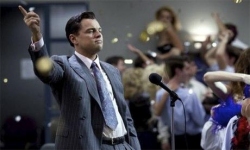
***1/2 stars out of **** Conveying a message in a movie is a tricky proposition.If a filmmaker pushes too hard, it opens the film up to accusations of heavy-handedness.But if a film doesn't hammer the point home, then it runs the risk of having its message misinterpreted by moviegoers.The Wolf of Wall Street, already one of the year's most polarizing films, falls into the latter category.
In terms of pure cinematic value, it's hard to argue against this film, based on the true story of Jordan Belfort (Leonardo DiCaprio). Belfort rose from a humble background to extreme wealth via shady stock deals. Martin Scorsese and screewriter Terence Winter approach the material as a dark comedy. While someone like Spike Lee or Oliver Stone would have inundated the audiences with speeches about the evils going on, Scorsese prefers to observe.
The movie's three hour running time flies by; most movies of this length have at least a few moments that sag, but Wolf is over in a heartbeat. Some of the sequences rank among the best of Scorsese's distinguished career. A scene where a quaalude overdose kicks in just as DiCaprio receives bad news is a masterpiece of both sustained tension and physical comedy. Scorsese's use of music remains impeccable.
The area where people will criticize The Wolf of Wall Street will be its message. Since the film does not take itself especially seriously and does not shy away from depicting Belfort's extravagant lifestyle (imagine a stereotypical frat boy's wildest fantasies come to life), people will argue that the film glamorizes a psychopath.
This argument is valid enough that it deserves serious consideration. Belfort's actions had real consequences for a great many people. It's doubtful that anyone who was victimized by Belfort's behavior will be amused by a film being made about the man's life. Even if it's meant to be a dark comedy, these people will likely (and completely understandably) feel that there's nothing funny about it at all. It's hard to counter this argument, especially since none of Belfort's victims receive any screen time.
Many more people are accusing Scorsese of glamorizing Belfort. This is always a trap for satirists: the chance that your satire will fly over the heads of your audience. Some people loved the bigoted Archie Bunker in the satirical TV show All in the Family because they felt someone was finally "telling it like it is." Unless you spoon feed your audience, there's always the risk this will happen. Press reports of raucous screenings of the film amongst Wall Street types indicate that it's already happening. It may become the Scarface of a new generation, a film that's so entertaining that its anti-hero is mistaken for an actual hero.
But to anyone actually paying attention, Scorsese is not presenting DiCaprio as a hero (he punches his wife in the stomach in a late scene). In one of the film's rare on-the-nose moments, DiCaprio informs the audience that he got a slap on the wrist for his crimes because he was rich. That's a pretty succinct indictment of America's shameful legacy of coddling and idolizing rich people while demonizing poor people.
Yes, people may look at this story and think that because Belfort got away with his crimes with minimal punishment, then that means he's a role model. They may think money should be pursued without any consideration to human or legal costs and women should be treated purely as sex objects and trophies. If you leave this film thinking that's how a person should live his/her life, then you were probably morally bankrupt already and this movie had nothing to do with it.
But if you want to see an aging cinematic master at the top of his form and have something to think about when you leave the theater, check out The Wolf of Wall Street.

